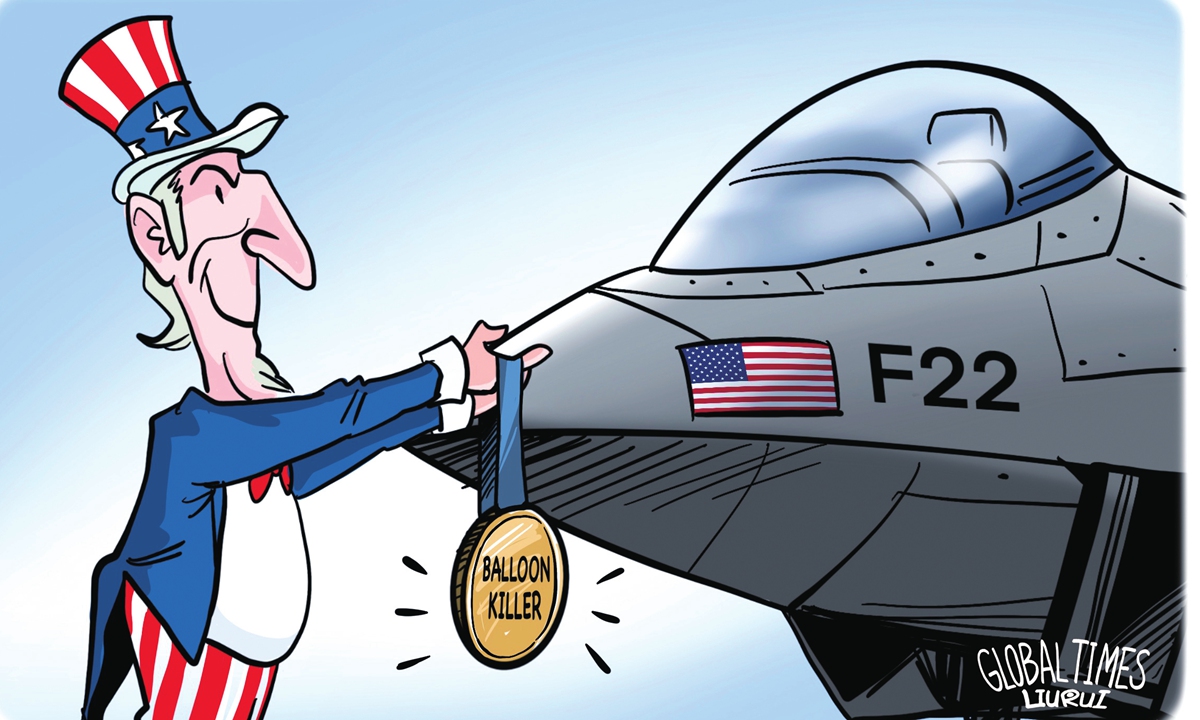
Illustration: Liu Rui/Global Times
The hysterical reaction in Washington DC to a drifting Chinese meteorological balloon raises many questions. Can Washington appropriately manage relations with China? Will relations continue sliding toward rock bottom?
American politicians and mainstream media went ballistic over the balloon lazily drifting in the stratosphere above North America. Apparently, Canada kept calm relatively and carried on.
The North American Aerospace Defense Command (NORAD) operated by the US and Canada duly performed its job monitoring the wayward balloon. Although the command was set up in the Cold War era to monitor incoming nuclear missiles and strategic bombers it apparently does a good with stray balloons.
It should be noted that US Army plans for the use of high-altitude balloons for the purpose of a layer of surveillance, communications, and range extension. Testing and experiments with high-altitude balloons have taken place at White Sands Missile Range in New Mexico. The operational range is 60,000 to 90,000 feet in altitude.
The political frenzy in Washington bodes ill. It demonstrates an unsteadiness and lack of judgment in the US political leadership. The Pentagon stated that the balloon did not pose a national security threat to the US, but the nervous White House politicos ordered it shot down.
Shooting down a meandering balloon unnecessarily as a grandiose media stunt does nothing to stabilize the greatly deteriorated US-China relationship. In fact, the action reinforces the observation by some world leaders that the US is unreliable and not capable of serious diplomacy.
Managing incidents at sea or in the air is part and parcel of international life. Countries sign diplomatic agreements to establish procedures to handle such matters. The balloon floated in the stratosphere. Will China and the US develop procedures to deal with incidents in the stratosphere and in space above that?
Of course, the US and China should have such agreements in place. Accidents and various kinds of incidents can lead to grave confrontation so it is better to reduce any tensions through diplomacy. Stabilizing US-China relations should be a key objective in bilateral diplomacy at this time.
Unfortunately, the direction of the relationship is in a downward spiral. Under President Obama, the US initiated its "pivot" to the Pacific which involves military, diplomatic, and economic elements. Under Trump the US unleashed both a trade war and a tech war. Under Biden the US has intensified these things. Under all three the militarization of the Pacific has gone forward.
What does Washington's frenzy over the balloon incident signal to the rest of the world? That the US is jumpy, nervous, and lacks confidence? That its leadership is unable to stay calm and properly manage affairs?
The US had several diplomatic options. The Chinese ambassador to the US could have been summoned for an explanation and to signal concern. The US ambassador to China could have asked for answers and assurances from the Chinese Foreign Ministry. Such a professional and low-key approach would be a normal way forward. Instead, US bluster erodes confidence in the possibility for quiet and effective diplomacy.
Blinken could have gone forward with a visit although the Chinese side has stated that neither country officially announced such a visit. But if a visit would have gone forward it would have been a simple matter to add the balloon incident to the agenda. On the other hand, did Blinken actually intend to visit China or was the news some sort of publicity stunt?
Whatever the case, it is clear that some serious engagement and diplomacy is needed to stabilize the deteriorating US-China relationship before things get out of hand. After a certain point, it may not be possible to repair relations for some time to come. This then leads to a period of instability during which grave confrontation could occur.
The Biden administration needs to shape up and stop behaving like a school boy bully. Serious diplomacy is called for but is Washington capable of that?
The author is an educator and former senior professional staff member of the Senate Committee on Foreign Relations. opinion@globaltimes.com.




